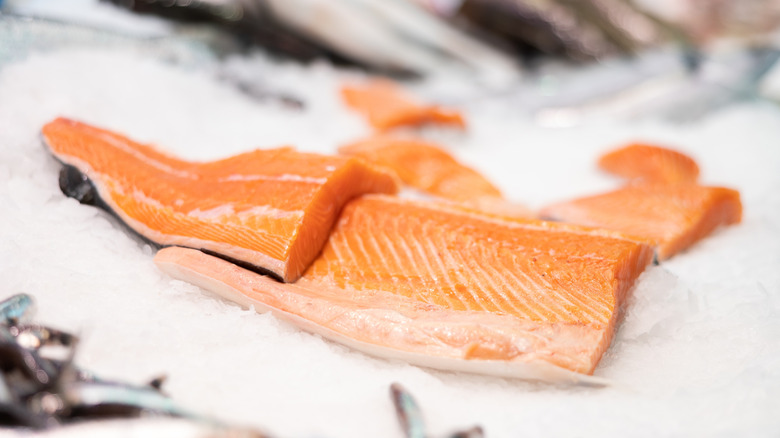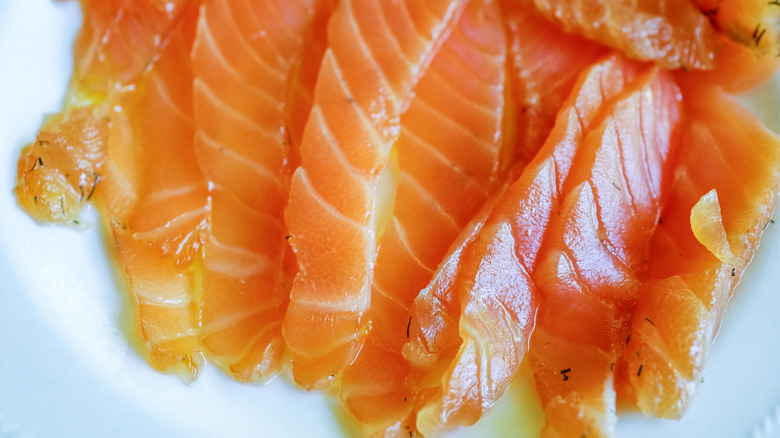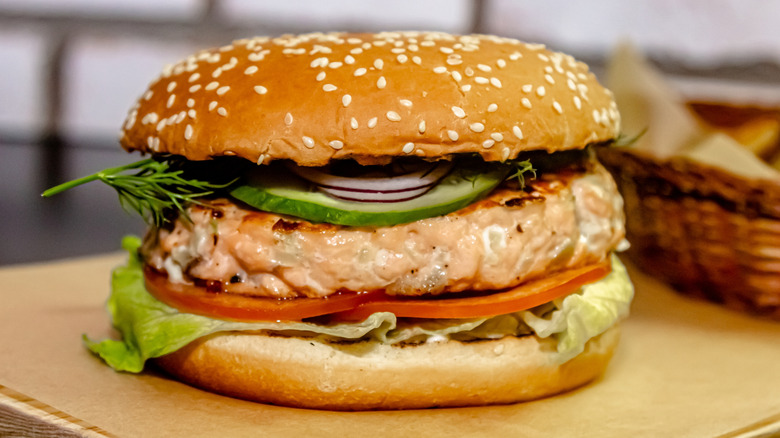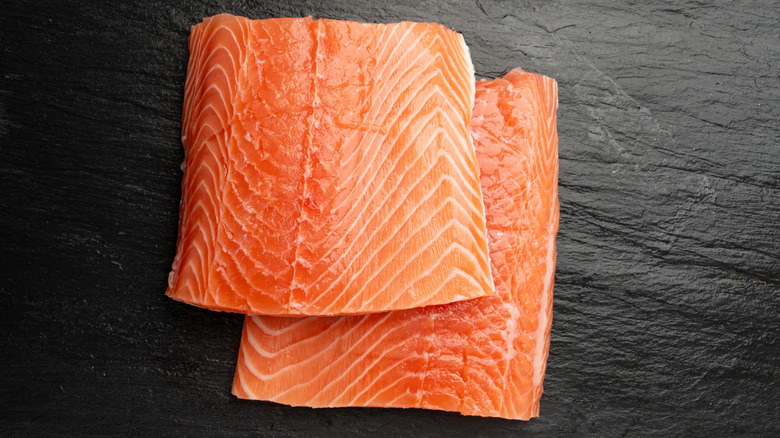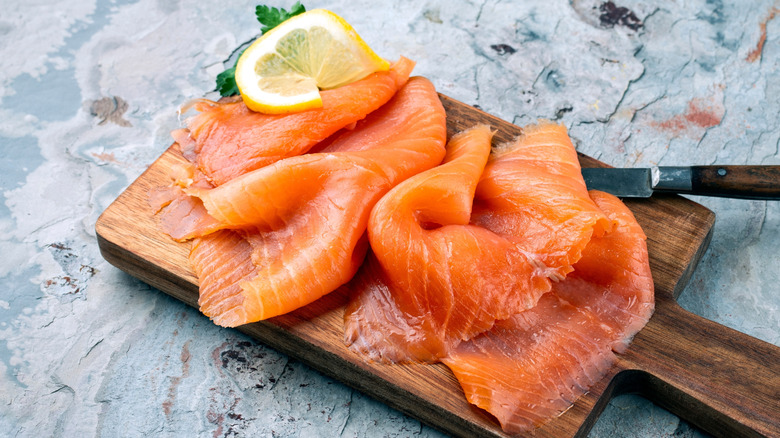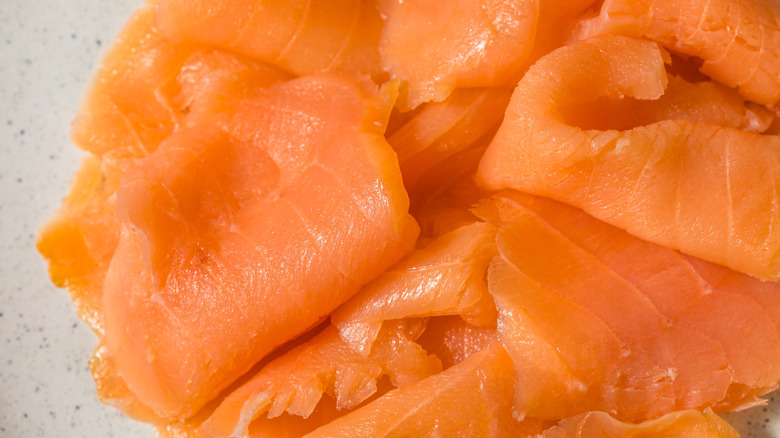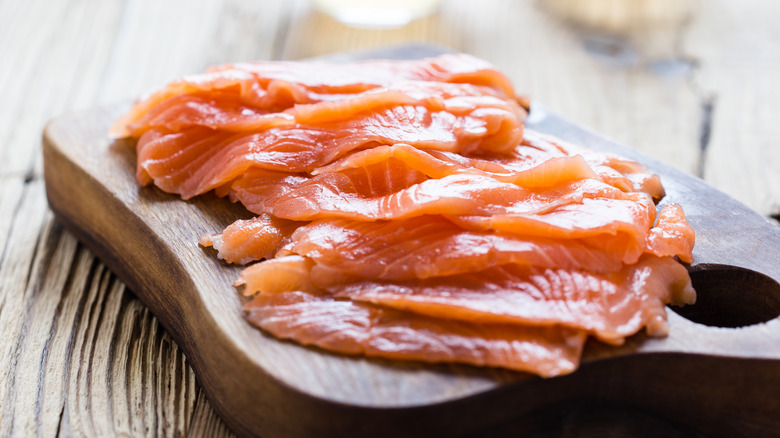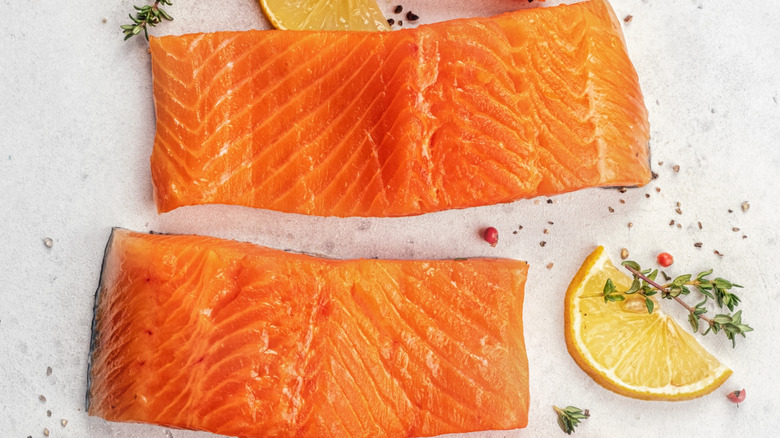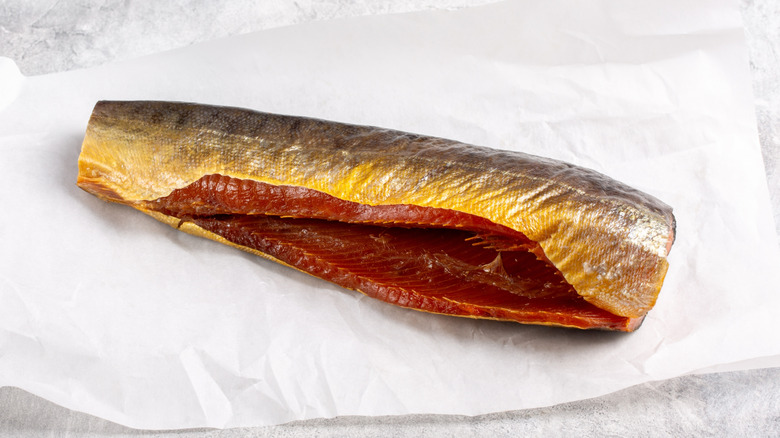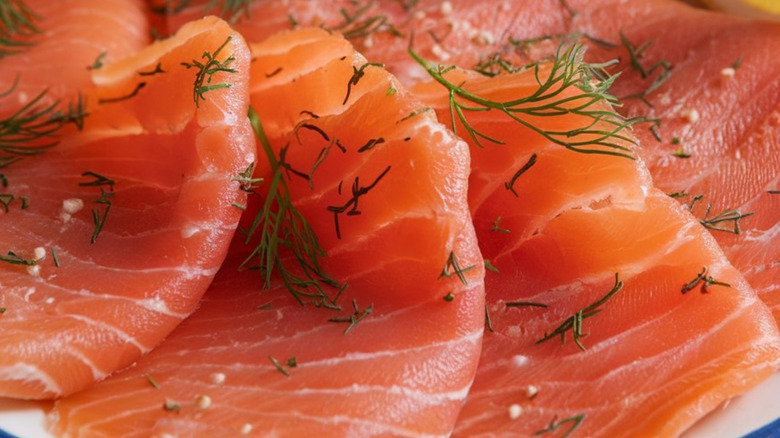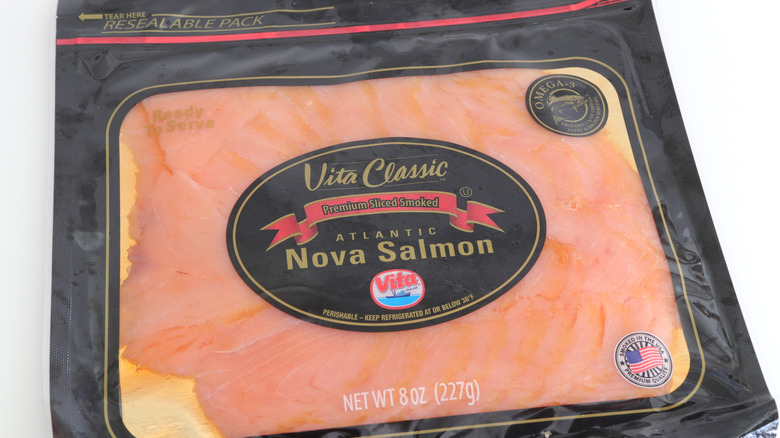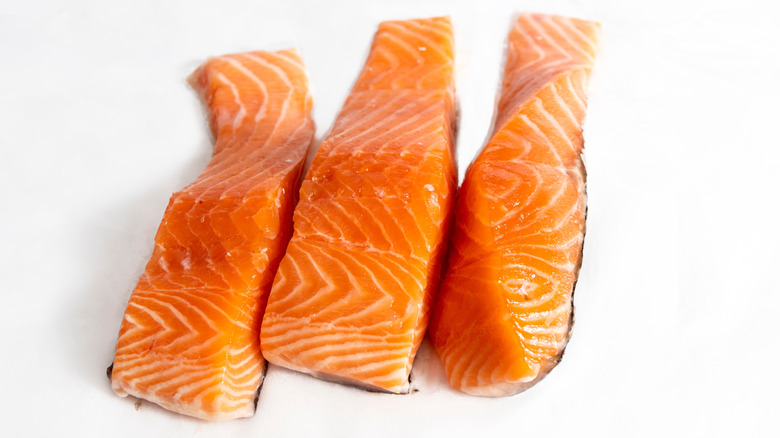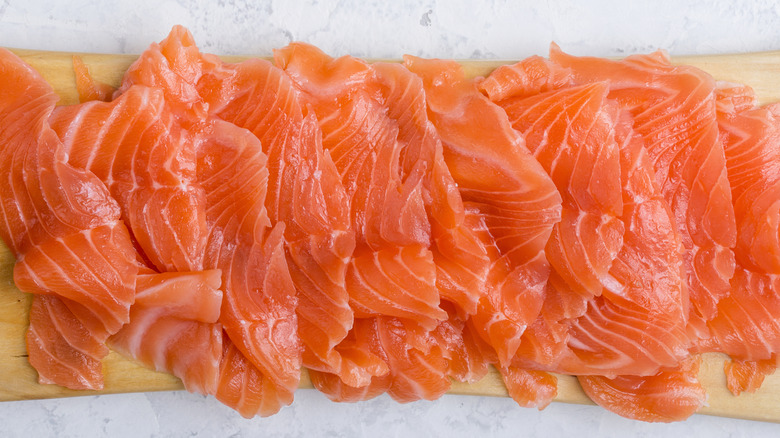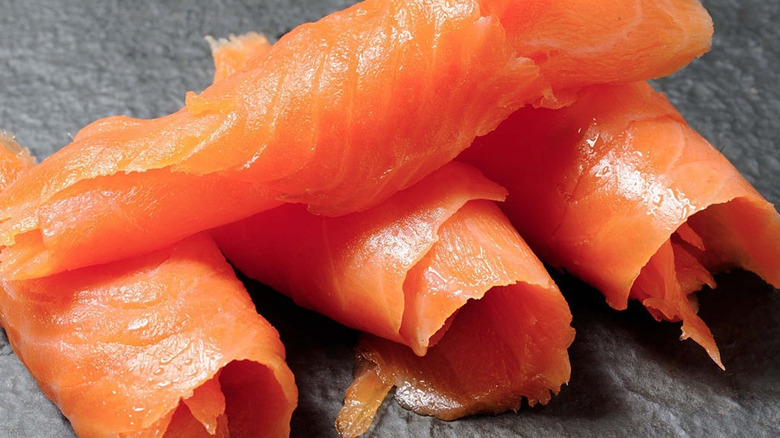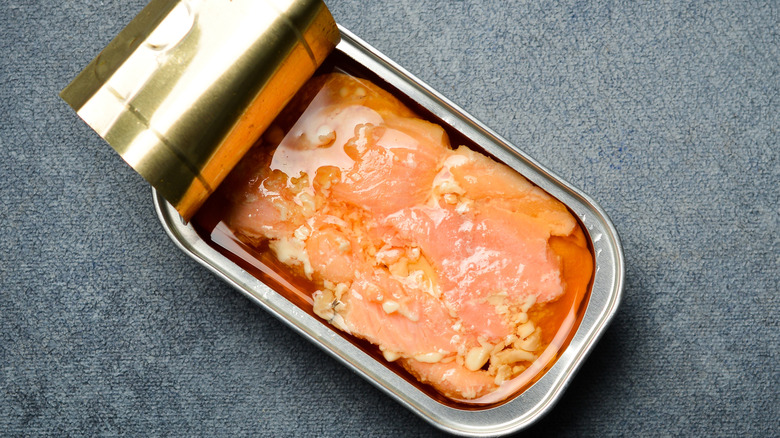The Biggest Salmon Recalls In US History
Salmon is, without a doubt, one of the most popular types of fish for U.S. consumers. This is helped by its nutritional value, but also because it's incredibly versatile — it can be enjoyed smoked with eggs, for example, grilled with vegetables, or baked and slathered in lemon and dill sauce. Gordon Ramsay fans know that the chef is all about pan-frying the fish until tender.
But there are some major downsides to salmon. In 2017, some salmon caught off the Alaskan coast, for example, had tapeworms. The fish has also been known to carry deadly parasites, and in some cases, it can harbor dangerous bacteria, too. Listeria is one of the common strains of bacteria found in smoked salmon, for example, but the fish can also contain salmonella and Clostridium botulinum, too. All of these strains of bacteria can be life-threatening.
If you're concerned about the safety of your favorite salmon dish, whether you love a salmon burger, a salmon fillet, or cold-smoked salmon slices, it's a good idea to keep an eye out for recalls. This is because companies and authorities will often pull fish from the shelves if it's considered to be a health risk. Intrigued? Find out more about some of the biggest salmon recalls ever below.
More than 110 cases of Kirkland smoked salmon recalled from Costco due to listeria (2024)
Costco has had to deal with some major food recalls in the past. In 2022, for example, it had to recall bags of walnuts because they tasted and smelt rancid. In 2023, the chain had to pull bags of shrimp from shelves over fears they contained plastic pieces up to 5 millimeters in length. And the recalls didn't stop there. In 2024, it had to recall more than 110 cases of Kirkland Signature Smoked Salmon from its warehouse stores in Florida over fears they contained listeria, a strain of deadly bacteria.
The Kirkland recall was issued after laboratory tests found listeria in samples of the Kirkland smoked salmon. If consumed, listeria can cause listeriosis, a dangerous infection with symptoms like fever, headache, and diarrhea. In rare cases, it can be life-threatening. Fortunately, nobody reported any illnesses as a result of consuming the recalled Kirkland products.
Raw SeaFoods recalled salmon burgers from Whole Foods stores nationwide due to undeclared allergens (2023)
Salmon burgers are popular for a few reasons — they're nutritious and versatile, for example. But they're not always safe for everyone to consume. Sometimes, they can contain allergens, like sesame seeds or milk. This isn't generally a problem if the allergens are clearly marked on the packaging for consumers to see, of course. But in 2023, Raw SeaFoods shipped out salmon burgers to Whole Foods Market stores across the country without listing the allergens (sesame seeds and milk) on the product. The issue was brought to light when employees at one of the stores spotted sesame seeds inside the burgers.
Luckily, there were no reports of allergic reactions as a result of the error. But anyone with an allergy to sesame or milk was urged not to consume the product for their own safety. Instead, they were encouraged to take the burgers back to Whole Foods for a full refund.
Northeast Seafood Products recalled multiple fish products, including salmon, from 3 supermarket chains in Colorado amid salmonella outbreak (2021)
Listeria isn't the only form of harmful bacteria that can lurk in fish products like salmon. In 2021, Northeast Seafood Products had to recall multiple fish products, including coho salmon, salmon fillets, and Atlantic salmon, from Albertsons, Safeway, and Sprouts stores in Colorado due to salmonella concerns. If consumed, salmonella can also cause unpleasant symptoms like nausea and diarrhea. In rare cases, it can lead to dangerous and life-threatening infections. At the time of the recall, the salmon had also been sent to restaurants across Colorado.
Unfortunately, in this particular case, the recalled fish was linked to an outbreak of salmonella. As a result, Northeast Seafood Products shut down its facility while it dealt with the bacteria and urged anyone who had already consumed any of the recalled fish products not to consume them.
Sullivan Harbor Farm recalled salmon from 23 states amid botulism fears (2019)
Another strain of bacteria you definitely don't want to find in your salmon? That's Clostridium botulinum. If consumed, it can lead to a disease called foodborne botulism. This disease can lead to muscle paralysis, breathing difficulties, and in some cases, it can even be fatal. That's why, in 2019, Sullivan Harbor Farm recalled its Cold Smoked Salmon from retailers and wholesalers in 23 states. The fish hadn't tested positive for the bacteria, but it had been sold with incorrect storage instructions.
It turns out, the salt concentration in the product wasn't high enough for it to be kept refrigerated. To prevent bacteria growth, the fish should have been kept frozen. However, the label on the Cold Smoked Salmon informed consumers they could keep the fish in the fridge.
Because the Cold Smoked Salmon was sold frozen, any customer who had kept the fish in the freezer was told simply to keep it there until it was ready to consume. Anyone who had kept the salmon in the fridge was warned not to consume it under any circumstances.
Springfield Smoked Fish recalled presliced salmon sold nationwide after listeria was found (2017)
In 2017, listeria was the cause of another salmon recall. This time, Springfield Smoked Fish had to pull its presliced Nova Salmon products from shelves in retailers and wholesalers in seven states: Massachusetts, Connecticut, New York, Rhode Island, Colorado, Ohio, and Pennsylvania. On top of this, it also had to recall the fish from its online customers located nationwide.
Listeriosis is particularly dangerous for people who have a weakened immune system, the elderly, and pregnant people. In fact, it can even lead to major pregnancy complications, like miscarriage, premature birth, and stillbirth.
Thankfully, this particular recall was not the result of a listeria outbreak. It was actually issued after Springfield Smoked Fish conducted testing on its own products and received a positive for the bacteria. In a bid to protect people from serious illness, anyone who had already purchased the Nova Salmon was encouraged not to consume it and instead return it for a refund.
Smoked fish, including salmon, recalled from 13 states over listeria contamination (2016)
Smoked fish like salmon is high-risk for listeria (if you need proof of that, just look at this list). Cold smoked salmon is particularly dangerous, and this is because the fish is never actually cooked before it's eaten. Heat is essential for eliminating bacteria, especially particularly hard-to-kill types like listeria, which isn't destroyed by refrigeration or even freezing temperatures.
In 2016, New York-based OLMA-XXI Inc. was reminded of this risk when it had to recall its smoked fish from retailers and warehouses in 13 states after product testing found traces of listeria. This time, the testing was not carried out by the company, but by the Division of Food Safety at the Florida Department of Agriculture and Consumer Services. Again, luckily, nobody reported any signs of illness as a result of consuming the recalled products. However, in an abundance of caution, anyone who had already bought the fish was urged not to consume it.
Smoked salmon and Atlantic salmon recalled from New York and Connecticut over listeria fears (2016)
Also in 2016, food safety inspectors found traces of listeria in another smoked fish facility. This time, the company responsible was Mt. Kisco Smokehouse, also based in New York. As a result, its smoked salmon and sliced Atlantic salmon had to be recalled from both stores and restaurants in two states, New York and Connecticut.
The listeria was not found in any actual fish samples, but in the drains and floor cracks of the facility. This means that there was a risk that the bacteria could have transferred across to the food.
Mt. Kisco Smokehouse's New York facilities were closed while the source of the listeria was investigated by federal authorities. As mentioned above, this bacteria is incredibly hardy and difficult to eliminate. It can even be resistant to common cleaning products, and often requires heat treatment to kill.
Loki Fish Co. recalled wild smoked pink salmon from 3 states after positive listeria tests (2016)
It seems that 2016 was a bad time for smoked fish companies. In the same year, Seattle company Loki Fish Co. also had to recall its smoked pink salmon from three states (Oregon and Washington, where it was being sold in stores, and Washington, where it was sold online and at farmers markets) because of potential listeria contamination. This time, the bacteria was picked up via random product testing conducted by the Washington State Department of Agriculture.
At the time, Loki Fish Co. explained that the salmon had been smoked with heat, so it was likely that the listeria contaminated the fish during packaging, not preparation. Anyone who had already purchased the smoked pink salmon was urged to dispose of it or return it for a refund in order to eliminate the possibility of developing listeriosis. The disease is rare, but it does happen. Every year, listeria infects around 1,600 people in the U.S. Of those people, around 260 will die from the infection.
Smoked salmon sold under 7 brands recalled in California due to listeria (2015)
In 2015, listeria struck the smoked fish market again. Santa Barbara Smokehouse had to recall cold-smoked salmon, sold under seven brand names (including Harbor Point, Coastal Harbor, and Channel Islands) across California due to concerns the fish contained listeria bacteria. At the time, the fish had been sold to a number of different companies, including airline catering businesses and wholesalers.
As highlighted above, cold-smoked salmon is a particularly risky choice when it comes to listeria, because cold temperatures do not kill the bacteria. In fact, the Centers for Disease Control and Prevention recommends cooked smoked options as the safest choice for anyone who wants to eat smoked salmon.
Fortunately, the listeria at Santa Barbara Smokehouse was not found as a result of a listeriosis outbreak. Again, it was the result of product testing by the California Department of Health.
More than 1,800 pounds of sliced smoked salmon recalled due to listeria concerns (2014)
In 2014, you guessed it, listeria was the cause of yet another smoked salmon recall. Sensing a pattern? This time, it was Vita Food Products that had to issue the recall, after the Florida Department of Agriculture and Consumer Services tested one of its products and found traces of listeria inside. In total, more than 1,800 pounds of Vita Classic Premium Sliced Smoked Atlantic Salmon had to be recalled.
Fortunately, nobody reported any symptoms of listeriosis as a result of eating the recalled salmon. This was lucky, as the smoked fish had already been sent to grocery stores, including Publix and H-E-B, in nine states: New York, Massachusetts, Vermont, New Hampshire, Alabama, Florida, Georgia, Texas, and South Carolina. However, anyone who was concerned about unusual symptoms after already consuming the fish was urged to go to the emergency room or consult their healthcare provider for urgent advice.
Marine Harvest recalled salmon from 11 states and Puerto Rico due to listeria concerns (2013)
If you thought we might be done with the listeria recalls, unfortunately, that's not the case. In 2013, this pesky strain of bacteria struck again. Delifish, the smoked salmon division of Marine Harvest (now known as Mowi), had to recall salmon from 11 states and Puerto Rico due to listeria fears. Several products were affected, including Black Bear of the Black Forest Smoked Salmon, Royal Fjord Sliced Smoked Salmon Loin, and H-E-B Smoked Salmon.
Unfortunately, this wasn't the last time the company was caught up in a smoked salmon recall. In 2024, more than a decade later, Mowi had to pull Atlantic salmon from Canadian stores due to fears it also contained potentially deadly bacteria. This time, it wasn't listeria that was the main concern, but Clostridium botulinum. As highlighted above, if consumed, this bacteria can lead to botulism.
Smoked salmon recalled from Sam's Club stores in 42 states over listeria (2012)
If you're a regular at Sam's Club, you'll know that this Costo-esque warehouse chain is great for buying things like potato chips, canned drinks, spices, and cookies. But one of the things some consumers probably wish they hadn't bought from the chain in 2012? You got it, smoked salmon.
In December 2012, Sam's Club was affected by a recall issued by Tampa Bay Fisheries and Multiexport Foods. Once again, the problem was that a sample of fish had tested positive for listeria bacteria. As a result, Sam's Club locations in 42 states had to pull twin packs of smoked salmon off the shelves to protect consumers from getting sick. Luckily, there were no cases of illness reported, but customers were urged not to eat the salmon and to either throw it away or return it to Sam's Club for a refund.
Costco recalled smoked salmon from 250,000 consumers due to salmonella concerns (2012)
In 2012, a quarter of a million people received some bad news from Costco: the chain's Kirkland smoked salmon and Foppen smoked salmon were at risk of containing a strain of potentially harmful bacteria. This time, it wasn't listeria, but salmonella. Costco used an automated phone system to let the thousands of customers know that they were at risk. In total, more than 31,000 pounds of cold-smoked fish were recalled.
Both smoked salmon products had been produced by Foppen in the Netherlands and then exported to the U.S. to be sold in Costco warehouses across the U.S. The Dutch company was fairly confident that the exported fish wasn't affected by the salmonella, but chose to issue a recall for the products anyway to be on the safe side. Fortunately, no Costco customers reported salmonellosis as a result of consuming the fish.
Glen Dawn recalled smoked salmon from stores across the U.S. over listeria (1995)
Listeria doesn't just affect fish. In fact, it can lurk in many different food products, including soft cheeses, deli meats, unpasteurized milk, meat spreads, unwashed vegetables, unwashed fruits, and sprouts. But that said, there is no doubt that this bacteria has been a serious thorn in the side of the smoked fish industry for decades.
Back in 1995, for example, Glen Dawn had to recall smoked salmon products from stores across the U.S. due to fears they might contain traces of the deadly bacteria. The alarm was raised after several samples of the fish tested positive for listeria.
Again, just like with the 2012 Costco incident, the salmon had been exported from overseas. However, this time it came from the U.K. to the U.S. where it was sold under various brand names, including Glen Dawn, Fjord Dawn, and Sea Glow.
Nearly 60 million cans of salmon recalled over botulism incident (1982)
On most occasions, as you can see from this list, products that might contain bacteria are pulled from the market before they can do any harm. However, there are rare incidents when this doesn't happen. In 1982, unfortunately, a Belgian man's death from foodborne botulism was the reason for a major canned salmon recall. The fatality led to an investigation into canning equipment used to process salmon in Alaska, and ultimately resulted in the recall of almost 60 million cans of salmon.
Fortunately, there were no other fatalities linked to the canned salmon. The tragic incident also shone a light on the dangers of canned foods and the risk of Clostridium botulinum growth, and led to better quality control across the industry. Today, foodborne botulism cases are very rare. Data from 2019, for example, shows there were 21 cases in the entire U.S. that year.
